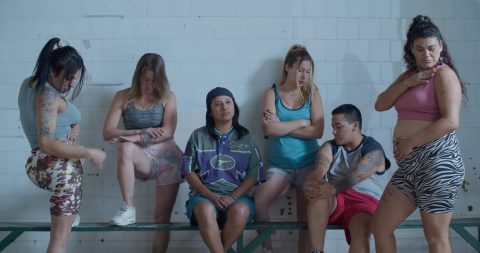Wicked Queer in Boston celebrated its 40th anniversary this spring as the fourth longest-running LGBTQI+ film festival in North America; the documentary extension, taking place in the fall, is now in its third year. I practically lived in The Brattle Theatre for a week earlier in 2024 to write about the fiction films at Wicked Queer, making this November weekend a return to a friendly environment in a cosy historic theatre.
Art is one outlet for change, and while simmering in disappointment about the US election, I dove into works of art about groundbreaking figures who lead small revolutions with their own art. I anticipated Wicked Queer Docs to be a community-forward event and I hoped it would be celebratory. And when the weekend came, festival director Shawn Cotter regularly implored audiences to turn to each other for support in their introductions to the films.
While my favourites last time were high-octane musicals, I also greatly enjoyed the documentary Lesvia (Tzeli Hadjidimitriou, 2024) and was looking forward to a festival focusing on a generally lower-key and informative genre. I didn’t know much about many of the people on display this weekend, making it a powerful journey through the stands people have taken for themselves — and for others.

Musical Portraits
What I have learned from my two outings with Wicked Queer is that the first night’s movie is usually a hit, often in an understated way.
WQ Docs kicked things off with George Michael: Portrait of an Artist (Simon Napier-Bell, 2023, above), a compelling construction of interviews and footage into a comprehensible overview of Michael’s life. With no original interviews from the late and great artist himself serving as some kind of narration, it felt like an authentic sample of his work and legacy, piecing together the mystery behind the icon. There was a focus on musical artists in this year’s WQ Docs selection. While this choice may have been to inspire joy in these trying times (as stated by Cotter in multiple introductions), Michael’s picture was more subdued, focusing on the snapshots of his life over the years, which included the mounting pressure and toxicity of fame.
Impactful though it was, Teaches of Peaches (Philipp Fussenegger, Judy Landkammer, 2023) showcased more of the electric atmosphere one might expect from a rock star documentary. A colourful compilation of music videos and interviews, with amazingly shot scenes from 2022’s The Teaches of Peaches anniversary tour, highlighting the ecstatic faces of the performers and audience members. The movie captures the intoxicating feeling of Peaches’ concerts, palpable even when I can’t say I particularly like her music.
These parts of the documentary were elevated by modern interviews with the singer herself, talking about striking outside the norm. The Peaches doc also brazenly displays the nudity at her concerts that is sort of censored by an initial Google search; the matter-of-fact attitude about bodies and wild, bizarrely provocative costumes illustrate this unorthodox piece of the music industry. Wicked Queer always delivers tastes of different subgenres of queer and artistic culture in the contained format of movies, so people walk away knowing about one more shade of the human experience.

Community Snapshots
The shorts programmes are a highlight of the main Wicked Queer festival. But WQ Docs only featured one shorts screening, which notably saw the biggest turnout of the weekend, early Sunday evening. “The promise of the camera has been rendering what has historically been invisibilised visible,” says author, poet, comedian and public speaker Alok Vaid-Menon in Alok (Alexandra Hedison, 2024).
Now is the time for experimental and short-form stories that can go anywhere in the world. It allows the most opportunity to illuminate the many ways people live, find their bliss and create their own unique communities — as joyfully seen in Pup Perfect (Henry Baker, 2023, above).
The shorts also demonstrated some more campy styles that I really enjoyed — like animated magazine collages falling into place and an unseen typewriter rendering quotes on-screen for Old Lesbians (Meghan McDonough, 2023), recounting the work of the Old Lesbian Oral Herstory Project through a heartbreaking and hilarious sequence of interview snippets. Trans Heaven, Pennsylvania (Hansen Bursic, 2024) was the shortest of the bunch and went straight to the point of the subjects talking about how a club in an LGBTQI+-friendly town empowered them elsewhere in their lives, using some suitable, yet almost juvenile graphics to tell the story. The Kiki House of Vase (Syrus Sad Vandi, 2023) was perhaps the most traditionally styled but still upbeat documentary short, which just let the interviewees talk about their lives while performing at a ballroom in Taipei.

Silence Speaks Loudest
Many festival attendees were looking forward to Reas’ (Lola Arias, 2024) reimagining of the documentary format. It unfolds like a traditional narrative film, following a young woman who is incarcerated for drug trafficking and bonds with her fellow inmates, leading to them recreating scenes from their lives within the prison’s walls, told through pop musical numbers. The music is effectively used to depict their daily routine in the face of injustice, the reenactments imparting the emotions behind the story even if they still have the stilted, low-budget feel of a bad community theatre production — in fact, that’s part of this documentary’s charm.
But the truly stellar selection of this chapter of WQ Docs was Janis Ian: Breaking Silence (Varda Bar-Kar, 2024, above). The documentary adopts an almost dreamy style in its linear presentation of the singer’s work, with a beautiful montage of old photos and footage. Many documentaries, including Teaches of Peaches, have an in medias res approach, landing in the middle of an artist’s career and going back to their upbringing and later breakout. While Breaking Silence briefly shows present-day Janis Ian at the beginning, it largely follows a classic narrative of her road to her stardom and the causes she championed, which worked even better with the romantic storytelling aura of her music.
Ian herself only appears in person again at the end of the doc (providing some voice-overs throughout), making for a fitting conclusion. Breaking Silence also repeatedly shows wide shots of the interviewees’ setups for filming, the room around the backdrops and the crew clearly visible, before cutting to their close-up with only a solid background — a strangely satisfying and home-grown element.
However, Breaking Silence triumphed by simply letting the story speak for itself, Ian, Michael, Peaches and most singers with any kind of “transgressive” exterior were at some point interrogated by the press about their sexuality; something that still hits home today when it inherently shows a lack of respect for people living in a myriad of ways, needing to be labelled for someone else’s comfort.
Every story told this week — The Life of revolutionary punk artist Sean DeLear (Markus Zizenbacher, 2024), the throwback to the struggles against biased ideals of femininity at a women’s bodybuilding competition in Pumping Iron II (George Butler, 1985), and the histories of the LGBTQI+ community at Fire Island Pines in A House Is Not A Disco (Brian J. Smith, 2024) — was worthwhile and inspiring, but I found out that I liked the classic documentary structure the most after all.
Abigail is a Boston-based freelance travel and culture writer, who also works as an editor for Screen Rant and curates her Substack newsletter All Things Abby.
